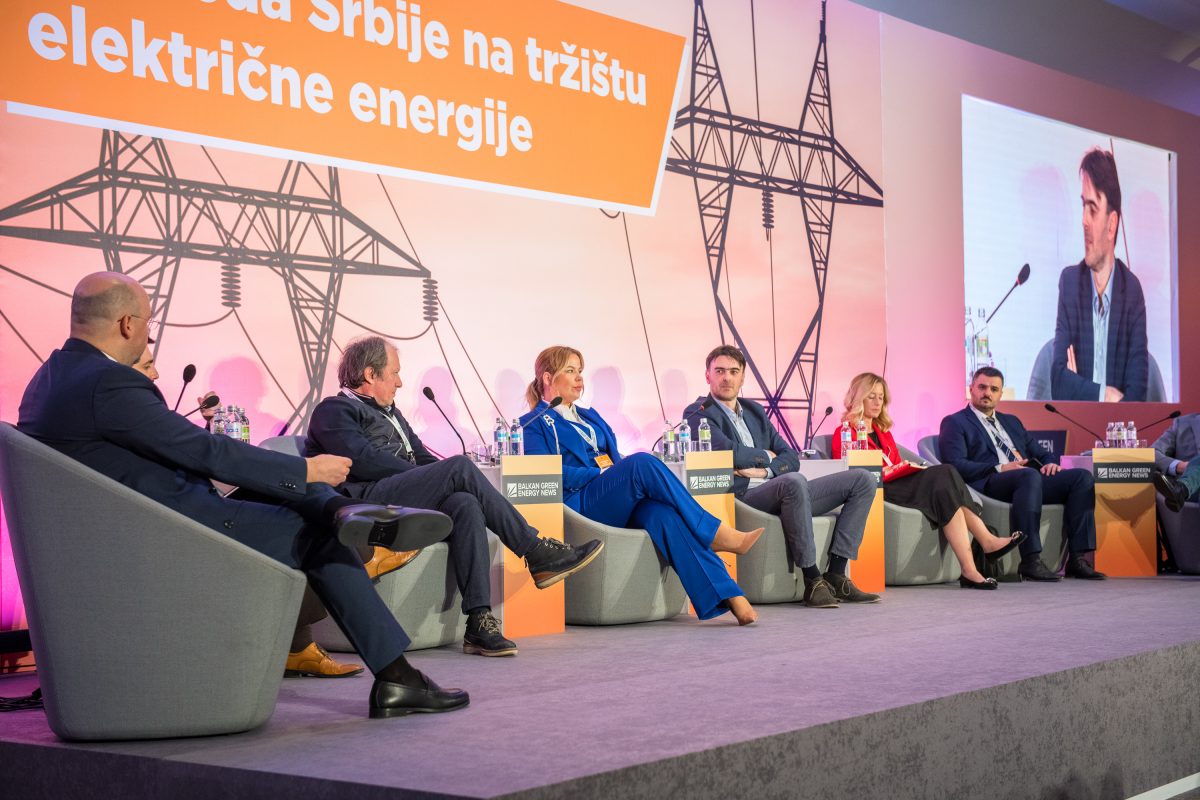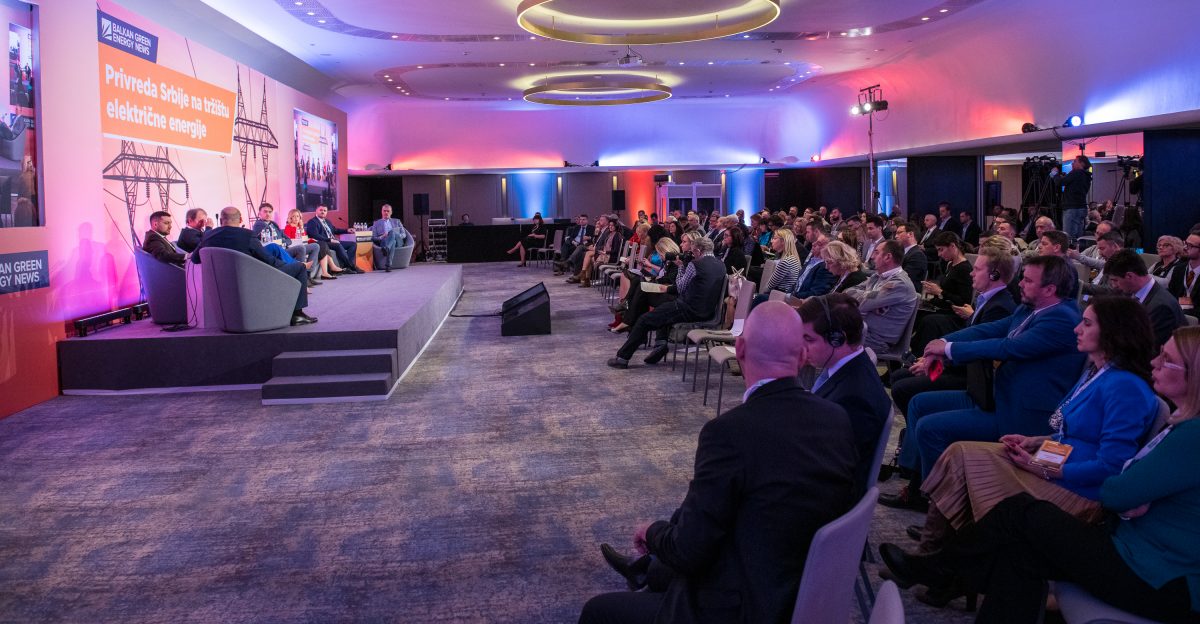The Serbian economy on the electricity market

The changes have started and their rate will increase in order to achieve the ambitiously set goals of energy transition on the way to climate neutrality
The electricity price will not return to the level it was before the energy crisis and every participant on the Serbian market will have to adapt to this. Changes for electricity producers, traders and buyers will also be made by energy transition toward renewable energy sources, as evaluated by participants of the conference “The Serbian economy on the electricity market”. There is a message from EPS that they are ready for challenges, that stable electricity supply for economy and citizens is provided and that they are working on solution for agreements with prosumers.
The conference, held on 22 February in Belgrade, organized by the portal Balkan Green Energy News, gathered experts from energy field, representatives of energy companies, the ministry, regulatory authorities, transmission and distribution system operators, businessmen, bankers and lawyers.
At the panel on possibilities for the economy on the electricity market in Serbia, Mr Davor Pupovac, the director of the Sector for Market Analysis and Risk Management in EPS, noted that EPS is capable of providing all quantities of electricity needed for the Serbian consumers.
– EPS is the only supplier on the market at the moment. Both, in Serbia and most European markets, small and medium suppliers have practically disappeared from the market because a large-scale price increase made them incapable of being competitive. During the crisis, the market does not operate as it should do and it cannot solve everything. Both, in Serbia and Europe, the traditional suppliers have taken all burden of crisis – said Mr. Pupovac.
Based on the Serbian Government recommendations, electricity prices for economy will be €75 for megawatt hour until mid of the year, while the average price on the Serbian market SEEPEX was €114 for megawatt hour last year. The price projections in the region are at €180 for megawatt hour for this year, and the next year is already at €150.
– All European countries have approved some kind of subvention and Serbia has done this, too. As a public company, EPS took this obligation and I think that all buyers are currently satisfied because they have electricity. With its resources and trade, EPS is capable of providing all quantities of electricity needed for the Serbian consumers – emphasized Mr. Pupovac.
He reminded that electricity is still the cheapest energy source in Serbia because it comes from local sources and that the company is waiting to see what will happen in energy field, ready for the next moves. – We have been competitive in the previous period and we are ready to face any challenge – concluded Mr. Pupovac.
The participants of all panels agreed that the changes had started and that their rate would increase for achieving the ambitiously set goals of energy transition on the way to climate neutrality. Seeing that the whole process is also a development chance, it was noted that this however requires changes within the whole society, where the hardest one will be a change of the people’s awareness. For households and companies, this means that these should become active participants from passive users on the electricity market. Serbia has also opened a gate of possibilities for households and companies to take an active role in providing electricity for their own needs. The interest is great, particularly for installation of solar panels, but there are still some open issues. One of these is signing an agreement between an electricity prosumer with a supplier.
– EPS will do anything for realization of cooperation with prosumers, there is no doubt about it. EPS is not a bottleneck but it is necessary to harmonize regulations. We are working on this actively and we expect to have a solution very soon – said Mr. Bratislav Džombić, the director of the Sector for Free Market Development in EPS.

The regulation on prosumers entered into force early in September 2021, and according to this regulation, value added tax (VAT) is calculated for the net electricity, i.e., a difference between a quantity taken from the power system and quantity supplied into the power system.
– In line with the regulation, EPS has prepared all documents, applications and model contracts, but upon analyzing the operational implementation, it has been concluded that this kind of calculation is not in accordance with the Law on VAT. Nowadays, EPS together with the Ministry of Finance and Ministry of Energy, is working on this and we are close to a solution – said Mr. Džombić.
The panel participants provided a clarification that the idea behind a prosumer should enable an active buyer to provide, primarily, energy for his own consumption through constructing capacities for electricity production from renewable energy sources, and, via an agreement with the supplier, to ensure taking electricity from the system when needed or deliver it when there is surplus energy.
– The idea is not to have a plant with a capacity greater than the consumption level of a facility; those who want something like that may participate on the market as producers and freely sell electricity per market conditions – it was said at the panel.
According to regulations, in case of agreements with economy, the principle of net calculation will be applicable for prosumers. In a monthly calculation, the supplied electricity is calculated to the quantity of taken electricity. If the quantity of supplied electricity in one calculation period is greater than the taken quantity of electricity, surplus of supplied electricity is transferred to the next calculation period. The price of the supplied kilowatt hour and of the one taken from the grid by the buyer will not be the same.
– EPS will have maximum fair offer, and difference between these two prices will not be great. – said Mr. Džombić and explained that the redemption price will be some percentage of the selling price.
Entering of prosumers into the Serbian energy market is only one of responses to requests for greater participation of renewable sources within the energy mix. The decision-makers noted that Serbia, faced with unprecedented electricity price increase, felt also all over Europe, can and must accelerate the energy transition process and attract more private investments in green energy.
– Changes are here. It is absolutely impossible, regardless all problems and resistance, to stay in the same place – said Ms Zorana Mihajlović, the Vice President of the Serbian Government and Minister of Mining and Energy. – With the revision of, virtually, all laws in the energy field last year, the country made the first step in the energy transition, and this task is not easy. Challenges are global, responses are national. There is no time to lose.
According to her statements, Serbia may attract many more investments and become something like a mecca for renewable energy sources.
– What awaits us is including the private sector and this is a matter that “hurts” many in our country. I think that without creating conditions for many more private investments in the energy field, primarily renewable energy sources, our energy will not have a future – said Ms Mihajlović.
She announced that in the coming month, Serbia should present six scenarios for national energy and climate plan (NECP), which will be subjected to public discussion. Preparation of strategy for development of energy for period until 2040 with projections until 2050 is ongoing, and it should also enable increase of the share of renewable sources.
The Director of the Energy Community Secretariat, Mr. Artur Lorkowski, said that some essential changes within electricity market organization will be needed for making markets in Energy Community more flexible and tailored to the customer.
– Serbia has already made an advancement by enabling application of new models such as energy storage, electrical vehicles, aggregators and prosumers, and it is necessary to adopt by-laws – noted Mr. Lorkowski.
Market
Serbia is one of leaders in creating conditions for whole-sale electricity market because it is the first Energy Community member that established a balancing market and organized Day-Ahead Energy Market. SEEPEX is still the only functional stock exchange of electricity on the West Balkan – said Mr. Lorkowski. Mr. Miloš Mladenović, the director of SEEPEX announced that in the last quarter of this year or in the first quarter of 2023, it is expected to have establishment of organized Intraday Energy Market.